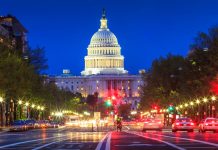The number of states introducing igaming is likely to continue growing where sports betting has been introduced as regulators get to grips with overseeing progress in the online gambling sector.
Speaking on a panel, part of an extensive regulatory track sponsored by IGT at today’s SBC Digital North America, FanDuel Director of Government Affairs Andrew Winchell said that he believed igaming will be a big boost wherever it is introduced.
Responding to a question from moderator Bill Pascrell III, Winchell explained: “What happened after PASPA when legislators looked at the sports betting legislation and realised that there were offshore operators taking business and the best way to tackle this was to legislate, but some of them have also taken the option of legislating for igaming at the same time.
“I think you will see other states really get into it when they get comfortable with regulating mobile sports betting. They will return to igaming and the revenue benefits provided by cross selling are excellent.”
Winchell cited Michigan and Connecticut as states that have regulated sports betting and igaming simultaneously and he anticipates others may follow suit.
Also on the panel was Josh Pearl, Director at Penn National Gaming, who named Wyoming as a state that stands out when it comes to gambling regulation for explicitly listing cryptocurrency in its legislation. Pearl said that Penn was generally supportive of crypto technology being incorporated into the entertainment mix and believes that Wyoming is a state to keep an eye on for developments in this area.
Bill Penders, Senior Advisor at New Jersey Economic Development Authority (NJEDA), was understandably bullish about his state’s performance since it regulated sports betting but said it was being more cautious on cryptocurrency than Wyoming. New Jersey, he explained, was waiting for the technology to get federal recognition before allowing it into the gambling mix.
However he lauded the Garden State as the perfect incubator for the sports betting industry highlighting the fact that it has overtaken Nevada sports betting revenues through its 21 sports betting licensed platforms. “It all starts with the regulatory environment,” Penders said. “It is the best-in-class in the US.”
Penders added that David Rebuck’s team at the Division of Gaming Enforcement (DGE) wants everyone involved to succeed and a key element of that is that they are not afraid of technology. He added: “Having a regulatory team as commercial and as collaborative as we have is a huge advantage to the industry.”
Brianne Doura-Schawohl, VP US Policy & Strategic Development, EPIC Risk Management, lamented the fact that in the rush to expedite the process of regulating sports betting, the focus has been on additional revenues and that other areas, such as problem gambling, have been overlooked.
She said: “It’s not going to help anyone if we see increased problems. Not just from the state revenue side but also from the perspective of the industry’s reputation.”
However, Doura-Schawohl conceded that there have been some interesting developments. In the past little or nothing has been allocated to problem gambling in states such as Wyoming, Tennessee, and Virginia, she suggested. But revisiting the laws has seen a re-examination of the issues around problem gambling and funds are starting to trickle in where there were none before which, she noted, is a positive development.
The Industry experts were speaking on the Regulatory Track, sponsored by IGT Play Sports, at SBC Digital North America, which runs from 9-10 June 2021. Get your free ticket by registering at https://sbcevents.com/sbc-digital-north-america/














